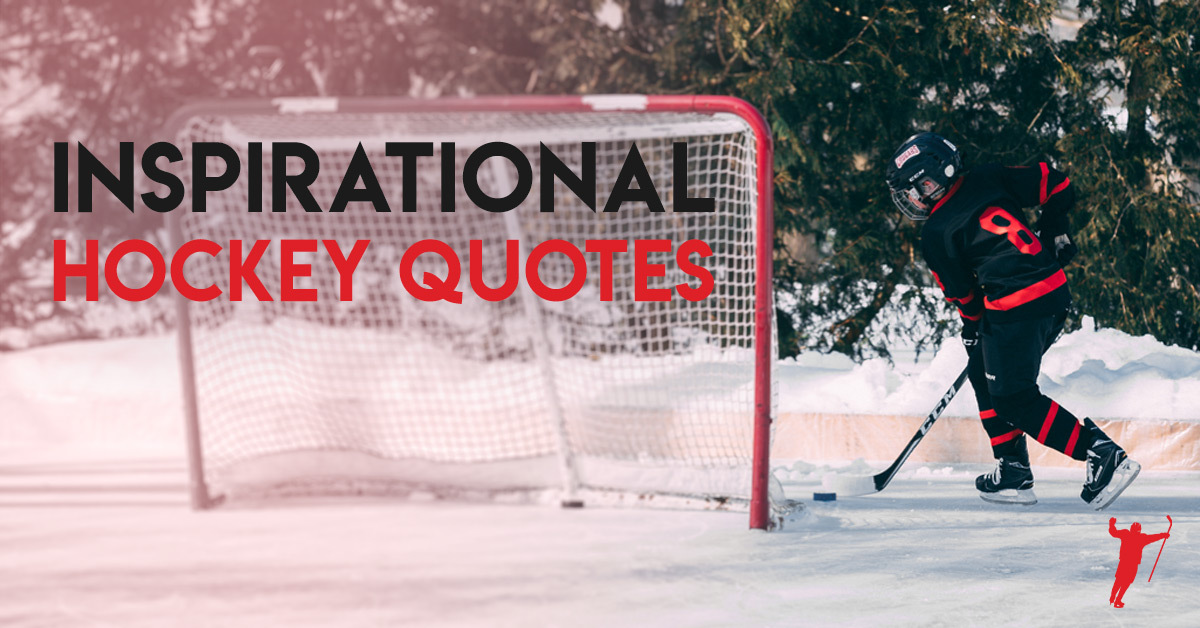Your body will never be able to fully express your hockey potential out on the ice until you train your mind just as hard as you train your muscles.
The mind is a huge source of energy.
This energy can be damaging and work against you, or you can harness it to give yourself a competitive edge on the ice.
Whenever you hear about true greatness in hockey, the power of the mind equals that of physical and technical ability.
You will never perform to the highest level of your capability until you match your inner drive with your physical ability.
Mental training allows people to walk on hot coals, climb Mount Everest, survive Navy Seal training, cross vast deserts, walk through entire countries, lift tremendous amounts of weight, and swim across ocean channels.
They perform despite being ill, despite terrible pain, and despite any odds that are stacked against them.
The body has a limit, but this limit is so much further than our minds ever allow us to go.
In this article, I want to pick out some of my all-time favorite inspirational hockey quotes and talk about the importance they carry towards achieving greatness in your life.
“90% Of Hockey Is Mental” – Wayne Gretzky.
I like this quote from Wayne Gretzky because it highlights some of the most overlooked aspects that truly allow hockey players to have great games regularly.
While everyone else is out there chasing the next new fancy toy to do stickhandling drills with, some of the most important qualities you will ever gain in hockey are:
Confidence.
Fearlessness.
Discipline.
Visualization.
Emotional control.
As a coach who has worked with thousands of hockey players, I can tell you without a shadow of a doubt that your outside world will naturally improve once you change your inside world.
Meaning, many hockey players have what I call “dormant performance.”
I call it dormant because they have the physical capability inside them already. However, it’s the player’s mind holding them back from expressing this ability due to a lack of the above mental characteristics.
Gretzky’s quote brings the importance of this type of training to light, and it’s one of the most important things a great coach could ever teach his hockey players.
Where the mind goes, the body will follow.
Take action on this type of mental training today and watch my video on how you can create unstoppable confidence before you hit the ice:
“Some May Have More Talent, But There Is No Excuse For Anyone Working Harder Than You” – John Tavares
In a society filled with magic bullets, overnight solutions, and the “right now” mentality that so many people have — it’s a breath of fresh air to hear a professional athlete point out the importance of hard work.
Discipline and delayed gratification are all-important to success in hockey as they are the seeds that grow your ability to concentrate your efforts into the direction you want your life to go.
I have never met anybody who was extremely disciplined but not successful, and I have also never met anybody who was highly successful and yet had no discipline.
Like the old saying goes…
Hard work beats talent when talent doesn’t work hard.
The talent pool in hockey is getting bigger every year, and because of this, talent alone is no longer enough to go far in hockey.
This isn’t the 80s and 90s. You need to marry both talent and hard work if you want to go far in this sport and become the best version of yourself.
Through various social media outlets, I am in contact with thousands of hockey players every single week, and even though I tell them about hard work regularly, I still get questions such as:
“Hey Coach Garner, what’s the one thing you would recommend to become a better hockey player?”
“Hey Coach Garner, I read your nutrition manual; it’s great! When can I have my first cheat meal?”
To the first question, I always think to myself, why would this hockey player only want to focus on one thing? You limit your potential before you even take your first step.
And to the second, whenever someone asks when they can have their first cheat meal before they even do one day on a hockey-specific meal plan, it says to me right away that they aren’t in the right mindset to start the meal plan in the first place.
These questions and many others, just like it, send the wrong message towards what’s required to be a good hockey player: hard work.
Nobody cheats or “hacks” their way to success in this sport. The sooner you realize that the sooner you’re going to be a better hockey player.
Success in hockey is simple once you accept how difficult it is.
Take action with your hard work in the right direction by learning how to set proper goals for yourself to become a better hockey player here:
“In This Jersey, I Promise To Play For The Logo In The Front, Not The Name In The Back” – Sidney Crosby
The world of mindset training is such an individual thing that it can be easy to forget that you’re a part of a team that all want the same things you want out on the ice.
Although setting individual goals for yourself is critical to long-term success in hockey, it can never come at the expense of the team or organization you’re playing for.
To reach your potential, you can’t just be great on the scorecards. You also have to be a great leader and example for the sport.
We have all played with a selfish hockey player before, and they never make it far because both the coaches and the players don’t want selfishness out on the ice.
Hockey is a team sport for a reason; we need each other out there.
If you’re playing alone, you might survive, but if you’re playing together, you’re going to thrive.
Learn how to become the captain of your team by harnessing some of the qualities Sidney Crosby to referring to in his quote by watching my video here:
“Everyday Is A Good Day For Hockey” – Mario Lemieux
You need to be passionate about hockey.
Passion is the driving force that allows you to develop a single-mindedness of purpose that ultimately gives you the will to go to the gym, follow your hockey meal plan, practice your skill work, go all-out in your dryland training, and then wake up the next morning and do it all over again.
Passion makes the difference between just going through the motions of hockey and pushing your body and mind to their limit.
Passion is what creates discipline because discipline allows you to express better the love you have for hockey by becoming a better player.
Becoming a better hockey player demands a lot from you, your schedule, and your overall lifestyle.
If you’re not passionate about hockey, you’re going to struggle significantly with all of the demands that your coach will place on you to keep up with the team.
Passion is what keeps you in the game, not just this year but for the rest of your life.
If you love hockey, then you are one of the few people who “get it” when it comes to Mario’s quote. I love what he said because it’s so short and so powerful at the same time.
If you want to learn more about the mental tools I have learned along the way to develop both short and long-term passion (even through the tough times), then check out this video and take action today:
“A Good Hockey Player Plays Where The Puck Is. A Great Hockey Player Plays Where The Puck Is Going To Be” – Wayne Gretzky
It’s not enough to just want to be fast or have a hard shot. Hockey is much more than that.
You need to have the mental foresight to predict the future and the physical fortitude to be able to act in the present.
Offensive and defensive awareness represent your ability to slow the game down, be patient, and not panic when a high-pace game is in action so you can be where the puck is going to be.
These are all mental tools that allow you to better express your physical ability out on the ice.
Gretzky’s quote translates even deeper into sports science and represents off-season and in-season periodization in many ways.
Something I always say to hockey players at the beginning of the off-season is that they need to start with the end in mind.
Hockey players need many different qualities to be successful. Hockey isn’t a one-dimensional sport like powerlifting or marathon running is.
In those sports, you only need to be strong (powerlifting) or have a large aerobic conditioning base (marathon running).
Yet, hockey players need:
- Aerobic conditioning
- Anaerobic conditioning
- Speed
- Mental agility
- Physical agility
- Strength
- Size
- Mobility
- Technical skill
- Various mental tools
This is a lot to take on from a training program design perspective.
Wayne says great players play where the puck is going to be. As a coach, I think this parallels perfectly to “starting with the end in mind” as you begin the off-season, not just looking to improve 1 or 2 of these qualities — but you should look to improve all of these qualities.
A good hockey player focuses on what they need right now, whereas a great hockey player focuses on the “big picture” so that they never miss anything along the way.
Visualization of both your on-ice and off-ice performance needs makes this quote from “The Great One” speak so loud to me.
If you want to learn more about how to use pre-game visualization for hockey success, then you have to check out my video on this topic here:
Final Thoughts
Anytime you undertake a difficult task, you have to accept the possibility of short-term failure.
Short-term failure’s come in the form of obstacles that block your path and have to be overcome for you to continue moving forward.
Despite reading some of the amazing quotes above from men who have accomplished things far more significant than me, sometimes the pain of failure can keep us in ruts that no motivational quote can get us out of.
I want you to know that failure doesn’t have to discourage you; instead, it can be a great training tool.
If you have come to this page because you’re currently in a performance rut, or if you have been cut from a team, or if you are just going through some short-term obstacles right now…
Then you need to take action and turn everything around to improve your all-around hockey performance. Watch these videos, take notes, and let’s turn this around so you can have the best season of your life this year!


Taveres quote. YES!